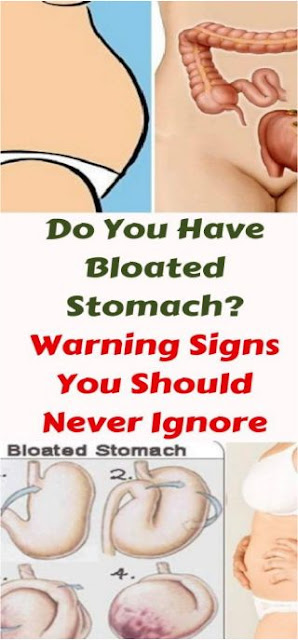Stomach bloating is a constant battle for a great number of people around the world. Most times, the symptoms occur as a result of diet, but also the reason can be more serious medical conditions. Bloated stomach can be triggered by poor diet, taking various medications, stress, environmental pollution, etc. Most cases include stomach bloating as a result of overeating, acid reflux, heartburn, IBS, swallowing extra air, imbalance of hormones, dysfunctional thyroid gland, food intolerance, carbonated drinks consumption, or too much bacteria in the intestines.
However, regular bloating can reveal serious health problems, so you have to learn the warnings and symptoms of these problems. It is essential to discover whether the symptoms are caused by a condition that needs immediate medical attention.
The following are the warning signs and symptoms:
OVARIAN CANCER
Constant bloating, pain in the pelvis, and feeling full are ovarian cancer symptoms. Risk factors are giving birth at a late age, but also not giving birth, genetics, obesity, etc. People over 50 are at a higher risk of developing this condition.
UTERINE CANCER
This type of cancer includes vaginal bleeding, vaginal discharge, pain in the pelvis, or pain during an intercourse and urinating. What can lead to this disease is estrogen medications in the absence of progesterone, tamoxifen, radiation therapy, genetics, and so on.
STOMACH CANCER
There are nearly no symptoms in the early stages of this disease. However, in the further stages, the affected person can experience weight loss, indigestion, flatulence, vomiting, and nausea. The bacterium H. Pylori is one of the biggest risk factors, including the nitrates and nitrites from processed food.
PANCREATIC CANCER
Symptoms of pancreatic cancer are weight loss, loss of appetite, pain in the upper abdominal area, etc. also, bloating with jaundice can indicate this disease.
WEIGHT LOSS
Losing 10 or more percent of the weight at a fast pace, without doing any physical activity or diet change can be an early sign of intestinal tumor. Also, you may experience intense bloating of the abdomen. Weight loss can take place as a result of tumors pressing the intestines. You will feel satiated after eating a small portion of food.
PELVIC INFLAMMATORY DISEASE
Fever, bloating, tendonitis and pelvic pain are one of the most common symptoms of this disease. Some STD can trigger pelvic inflammatory disease, such as Chlamydia or Gonorrhea. Vaginal discharge is one of the most important symptoms, so be careful because if you ignore it, the condition can lead to infertility.
COLON CANCER
This type of cancer can obstruct the inside of the colon and cause bloating. Bloating is the only symptom of early stage colon cancer, but in the advanced stages of the disease bloating occurs with constipation and bleeding.
BOWEL OBSTRUCTION
If stomach bloating includes vomiting, nausea, and constipation, it can happen due to bowel obstruction triggered by tumors or scar tissues. Their growth presses the bowels and blocks them, seizing the fluids and the stool. This problem is painful and will lead to irregular bowel movement.
FLUID RETENTION
Fluids can store in body parts like the pelvic area or the abdomen, causing excess weight and bloating. Liver disease and cancer can cause this. The symptoms can include liver failures, hepatitis, jaundice, change in eye color or abdominal pain.
CHRON’S DISEASE
This autoimmune disease affects the colon or the small intestine and bloating is one of the initial symptoms. Also, it can cause bowel obstruction, which causes bloating, nausea, vomiting and weight loss. Diarrhea with blood is the most common symptom when Chron’s disease affects the colon.
DIGESTIVE DISORDERS
IBS, celiac disease, ulcerative colitis or other gastrointestinal
disorders include symptoms such as gas, bloating, distension, etc.
LIVER DISEASE
Liver disease or cirrhosis can cause abdominal bloating. These diseases are triggered by hepatitis, overuse of drugs, serious drinking or liver cancer. Yellowing of the skin and eyes are other symptoms that can indicate liver disease.

